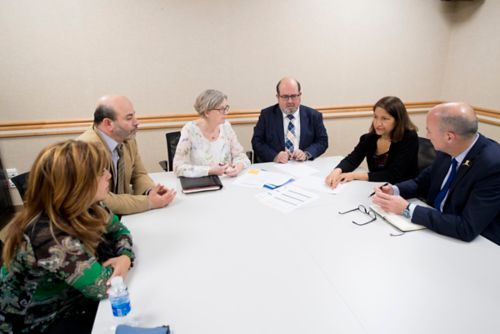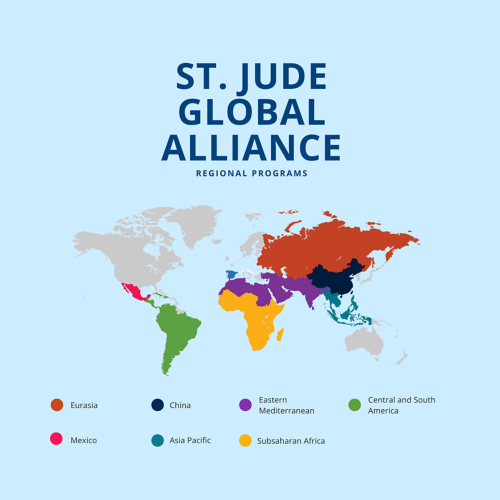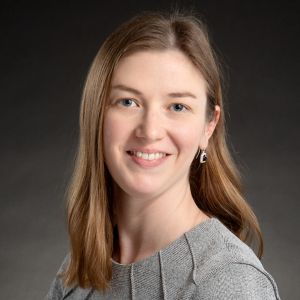St. Jude Family of Websites
Explore our cutting edge research, world-class patient care, career opportunities and more.
St. Jude Children's Research Hospital Home

- Fundraising
St. Jude Family of Websites
Explore our cutting edge research, world-class patient care, career opportunities and more.
St. Jude Children's Research Hospital Home

- Fundraising
Lessons from Lebanon: St. Jude Global reacts to war in Ukraine
By pulling from lessons learned in other crises and on established infrastructure and partnerships, St. Jude Global is helping childhood cancer patients in Ukraine.

Sima Jeha, MD, (second from right) and colleagues meet about their work helping Syrian childhood cancer patients in April 2018 at the King Hussein Cancer Center in Jordan.
In the U.S. television show Mister Rogers’ Neighborhood, the show’s host, Fred Rogers, once famously advised that in a scary situation the best thing to do is to, “Look for the helpers. You will always find people who are helping.” The team at St. Jude Global is dedicated to being those helpers when a crisis strikes childhood cancer patients. Right now, the team has mobilized to help in response to the Russian invasion of Ukraine in February. But how does an organization such as St. Jude identify productive and useful ways to help in a crisis?
St. Jude Global and the St. Jude Global Alliance were designed to forge partnerships with doctors and nurses, researchers, hospitals, foundations, non-governmental organizations (NGOs) and governments. These partnerships are the backbone of St. Jude Global and allow St. Jude faculty and staff to understand the culture and the needs of distinct places around the world. Having these established partnerships means that when a problem arises in a particular region, St. Jude already has a presence there.
Being able to pivot and adapt to crises to ensure that childhood cancer patients are safe and able to access treatment strikes at the heart of the St. Jude Global mission: to improve the survival of children with cancer and other catastrophic diseases worldwide through the sharing of knowledge, technology and organizational skills.
Partnerships guide the way forward
St. Jude has encountered war and the massive displacement of children in need of cancer care before. More than a decade ago the outbreak of war in Syria led to mass displacement of refugees. Investigators from St. Jude demonstrated the importance of local partnerships. Prior to the formal launch of St. Jude Global, St. Jude had partnerships in Lebanon, a country that shares a border with Syria. From 2011–2015 the documented number of Syrian refugees in Lebanon topped 1.5 million, with more assumed undocumented. Among the refugees, inevitably, were childhood cancer patients in need of treatment.
In a 2018 report in the journal Cancer, Sima Jeha, MD, St. Jude Global Eastern Mediterranean Region director, and her colleagues wrote of the Lebanese response to the sustained refugee crisis regarding displaced children with cancer. They found that the partnerships St. Jude had previously established with the American University of Beirut Medical Center and the Children’s Cancer Center of Lebanon Foundation made caring for these children feasible. The effort’s success and sustainability in Lebanon led to a similar program in Jordan to continue to serve Syrian refugees.
When the team initiated the program to assist displaced Syrian children, they also started working on realistic capacity building in Damascus to assist children still residing in Syria and to prepare for children to return when the crisis subsides. That program was described by Jeha and her colleagues in a perspective piece in 2021 in the Lancet Oncology.
“Our work to make sure that childhood cancer patients from Syria had access to necessary treatment was grounded in strong partnerships in the region,” Jeha said. “Our pre-existing partnerships, and the network of collaborations with both national and regional pediatric oncology units and NGOs, allowed our team to rapidly respond to the crisis by expanding infrastructure and resources. This response was indispensable for being able to offer refugee children with cancer a viable chance at a cure.”
The strategies that Jeha and her colleagues used to successfully get Syrian refugee children access to cancer care are echoed in the ways that St. Jude Global is currently helping Ukrainian children.

The St. Jude Global Alliance is built around regional programs around the world.
The Global Alliance in Eurasia
St. Jude Global is organized around regional networks, which form the St. Jude Global Alliance. The alliance takes a multilevel approach to developing regional, national and hospital-based initiatives centered on its member partners across seven regions and a growing number of cross-regional programs to ensure the advancement of care around the globe.
The regional programs are: Asia Pacific, Central and South America, China, Eastern Mediterranean, Eurasia, Mexico and Sub-Saharan Africa. The Eurasia region includes institutions in 15 countries: Ukraine, Belarus, Poland, Serbia, Romania, Moldova, Armenia, Azerbaijan, Turkmenistan, Uzbekistan, Tajikistan, Kyrgyzstan, Mongolia, Kazakhstan and Russia.
As such, the Eurasia Program, which is led at St. Jude by Asya Agulnik, MD, MPH, already had a presence in Ukraine when it was invaded by Russia. Agulnik is also leader of the St. Jude Global Critical Care Program. Immediately following the invasion, Agulnik and her colleagues launched SAFER Ukraine, a humanitarian effort to provide safe passage for childhood cancer patients and their families out of the war zone.
“We are living up to the founding mission of St. Jude that no child should die in the dawn of life. Nothing is going to get in the way of achieving that mission, not even war,” Agulnik said. “One of the most impressive things I’ve seen is the coming together of the international community who are really affected by the humanity of this work and the need of these children.”
Nimble in a crisis
SAFER Ukraine is evacuating childhood cancer patients and helping them find continuing care in other countries. The program is possible due to the partnerships and support of foundations, governments and professional organizations along with countless volunteers. In particular, St. Jude Global staff are working with Fundacja Herosi (Poland), Tabletochki Charity Foundation (Ukraine), Daruieste Viata (Romania), Polish Society of Paediatric Oncology and Haematology, Western Ukrainian Specialized Children's Medical Centre and numerous other colleagues in the region.
In a critical situation, which may be changing rapidly in addition to having safety concerns, it is especially important to listen to the people on the ground and identify useful ways to help. Responding in ways that are quick and nimble does not necessarily mean rushing in from the outside. It means figuring out key priorities and marshalling resources to meet the existing needs.
To respond to the war in Ukraine, St. Jude Global and SAFER Ukraine established a virtual command center to coordinate evacuations and ensure treatment continues for pediatric oncology patients. The process includes translating medical records; coordinating departure travel and managing the logistics of transport across the border into Poland; identifying patients who are deteriorating; providing a safe place to rest; and identifying clinics for continued treatment elsewhere across Europe and North America.
In a crisis, pull together
“How can I help?” It is a simple question, yet tremendously powerful. St. Jude Global and its partner organizations are dedicated to being the helpers that children with cancer and their families can look to, when faced with a crisis anywhere in the world. By leaning on established infrastructure and partnerships, St. Jude Global was poised to swiftly mobilize to assist Ukraine.
The team is guided by lessons learned from past conflicts and situations that demonstrated the power of teamwork and the importance of making sure children have safe access to cancer treatments. These principles continue to shape the work of SAFER Ukraine beyond this crisis and into the future so that the next time a crisis occurs, St. Jude Global will be ready to help.






